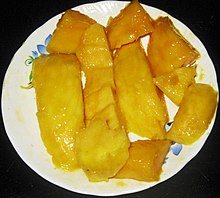



The 'Langra' mango, also known as Benarasi Langra,[1] is a mango cultivar that was first cultivated in Banaras in present-day Uttar Pradesh, India 250 to 300 years ago.[2][3] Apart from Uttar Pradesh, it is also grown in the states of Bihar and West Bengal,[2][4] as well in the neighbouring country Bangladesh.[5]
This cultivar retains a greenish tinge while ripening. It is normally harvested during mid-June to last half of July. Around 2006, it was known to be gaining popularity on the international market.[6] It is considered suitable for slicing and canning.[7]
Variants
In Eastern India there is a very sweet variation of the langra mango that is knows as Dudhiya Langra or Bhagalpuri Dudhiya Langra, this variant is green in colour and milk-like in smell, originally grown in Bhagalpur.This mango is not grown outside of Bihar and in other parts of East India but is easily available in markets.
In some part of northern India and in Bihar, there is another variation of the 'Langra' mango is also known as Malda Mango, this variation is orange in colour, less fiber and intense in smell compared to Dudhiya Langra, referring to the Malda village in Bihar and Digha, Patna region in Patna district. Malda mangoes is referred to as the 'king of the mangoes' in North India as well as Eastern India.[2]
One unique quality of Malda mangoes is its rich pulp and small seed whereas Langda is more fibrous than Malda.[8]
Leaves

The leaf blades have an oval-lanceolate shape and are flat to slightly folded. The apexes are acuminate to sub-acuminate. The secondary veins are arranged as sub-opposite to alternate.[9] They have been measured as follows:
- Length of blade: 21.93 cm
- Length of lamina: 18.95 cm
- Breadth of lamina: 4.75 cm
- Length petioles 2.98 cm
- Length of pulvinus region 1.20 cm
- Length : breadth of lamina: 4.00
- Length of pulvinus : petiole: 0.42
- Length of lamina : petiole: 6.67 cm
See also
References
- ^ "Mango Malformation". Dkchakrabarti.com. 12 March 2010. Archived from the original on 12 September 2014. Retrieved 13 June 2014.
- ^ a b c "Know The Actual Story Behind the Name "Langra Mango"". krishijagrancom. Retrieved 4 May 2023.
- ^ "Where does the Langra Aam get its Name from? An Interesting Take on this Most Loved Aam!". NDTV. 20 April 2018. Retrieved 4 May 2023.
- ^ "Varieties of Mango produced in West Bengal | Bengal Information - College, Admission, Events, Education, Tourism, Bengal Culture, Jobs". Bengal Information. 12 September 2012. Archived from the original on 15 July 2014. Retrieved 13 June 2014.
- ^ Kalam, M. A.; Hasan, M. R.; Miah, M. A. M. (2020). "Assessing the profitability and problems of langra mango variety marketing in Chapai Nawabganj district of Bangladesh". Journal of Agriculture, Food and Environment. 01 (4): 169–173. doi:10.47440/JAFE.2020.1425.
- ^ "Recent Trends in World and U.S. Mango Production, Trade, and Consumption" (PDF). University of Florida IFAS Extension. Archived from the original (PDF) on 27 November 2014. Retrieved 12 June 2014.
- ^ "Mango". Hort.purdue.edu. Retrieved 13 June 2014.
- ^ https://timesofindia.indiatimes.com/life-style/food-news/15-famous-mango-varieties-in-india-and-how-to-identify-them/photostory/69185528.cms
- ^ Chakraborti, Kalyan. "Leaf Charactersand Measurements Of Mango Cultivars In | Kalyan Chakraborti". Academia.edu. Retrieved 13 June 2014.
Further reading
- Singh, D. K.; Ram, S. (April–June 2000). "Level of paclobutrazol residues in shoot and fruit of mango" (PDF). Indian Journal of Plant Physiology. 5 (2): 186–188. ISSN 0019-5502. S2CID 81688595. Archived from the original (PDF) on 19 February 2020.










You must be logged in to post a comment.